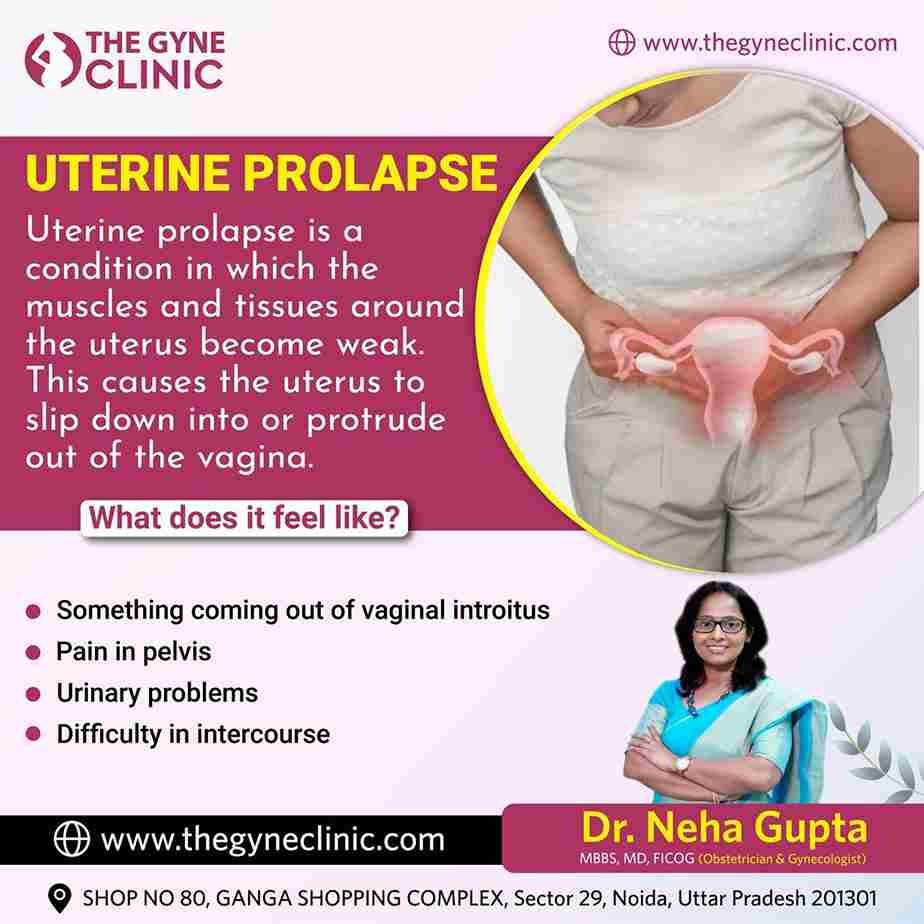
Pelvic Organ Prolapse Surgery: Surgical Solutions and Treatment Options
Struggling with pelvic organ prolapse condition? In this blog, we are going to discuss different treatment and surgery options that are available for POP. And if you’re suffering from the condition, reach out to Dr Neha Gupta for pelvic organ prolapse surgery in Noida.
Pelvic Organ Prolapse Surgery in Noida

What is Pelvic Organ Prolapse?
Pelvic organ prolapse is a common condition that impacts a woman’s quality of life. It is a gynaecological condition in which the muscles and tissues that support the pelvic organs get weak. This can cause one or more of the pelvic organs to drop or protrude into the vaginal canal. The pelvic organs include the vagina, cervix, uterus, and bladder, and they lead to certain discomforts and pains.
Pelvic organ prolapse is common in women and can also impact their bladder control. There are different types of prolapses, including cystocele, rectocele, uterine prolapse, and vaginal vault prolapse. Let’s know more about pelvic organ prolapse surgery in Noida.

Symptoms of Pelvic Organ Prolapse
You may not notice any of the symptoms of pelvic organ prolapse; however; your doctor may be able to diagnose it during the pap smear test. Some of the symptoms of pelvic organ prolapse include the following:
- A feeling of pressure or fullness in the pelvic area
- Lower back pain
- Difficulty emptying your bladder or bowel

- Recurring urinary tract infections
- A heavy sensation or dragging in the vagina
- Something coming down or a lump in the vagina
- Weak urinary system
What Causes Pelvic Organ Prolapse?
One of the most common causes of pelvic organ prolapse is pregnancy. Other reasons include ageing, chronic constipation, obesity, pelvic surgery, obesity, and certain connective tissue disorders.
If you have had any previous pelvic surgeries in which the removal of pelvic organs is involved, you may be at risk of pelvic organ prolapse.
Surgical Solutions for Prolapsed Uterus
Now that we have understood the symptoms and causes of pelvic organ prolapse, let’s walk you through pelvic organ prolapse surgery in Noida. Depending upon the severity and individual circumstances, there are several treatment options for pelvic organ prolapse. Here are some of the ways to treat the condition:
Hysterectomy
Hysterectomy is a surgical way to treat pelvic organ prolapse. In this gynaecological procedure, the prolapsed womb or uterus is removed through surgery. During this process, an incision is made in the abdomen or vagina to access the uterus and detach it from the connecting tissues, blood vessels, and ligaments. The womb is then removed from the body, either in one piece or in smaller sections.
Sacrocolpopexy

Sacrocolpopexy is a surgical procedure to treat pelvic organ prolapse, in which the muscles and tissues supporting the pelvic organs become weak and slip or protrude out of their normal position.
This procedure helps doctors lift the affected organs back into place and also relieves the side effects of prolapse. Sacrocolpoplexy is done robotically or laparoscopically to avoid large incisions and also to reduce the risks associated with the surgery.
Anterior and Posterior Repair
Anterior and posterior repair are the minimally invasive procedures that are used to correct pelvic organ prolapse. This surgical procedure is used to repair the front (anterior) and posterior (back) walls of the vagina. These repairs also help to strengthen the tissues and muscles supporting the pelvic organs and restore their normal position and function.
Vaginal pessaries
It is one of the treatment options that is used to treat pelvic organ prolapse. A vaginal pessary is a soft, and removable device that provides support to the areas that are affected by pelvic organ prolapse.

It is a non-surgical yet effective treatment option in which vaginal pessaries are inserted into the vagina to alleviate the symptoms related to prolapse.
CONCLUSION
Pelvic organ prolapse is a common condition in women, mostly after pregnancy and childbirth. There are various treatment options that are available, such as hysterectomy, vaginal pessaries, anterior and posterior repair, and others for treating pelvic organ prolapse. Consult your gynaecologist to explore treatment options that can treat your condition.
If you’re experiencing these symptoms or are suffering from POP, reach out to Dr Neha Gupta, the best gynaecologist and laparoscopic & robotic surgeon, for pelvic organ prolapse surgery in Noida. Having been trained in minimally invasive surgeries, she is the perfect choice for you if you’ve been advised to undergo pelvic organ prolapse surgery in Noida.